#and that’s to say NOTHING of John Crichton because everyone has already said it in better ways than i could. but yeah.
Text

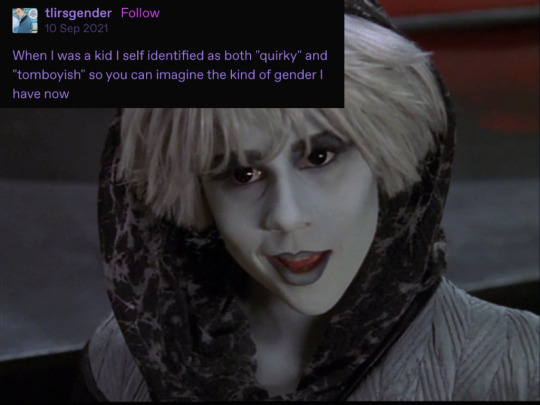
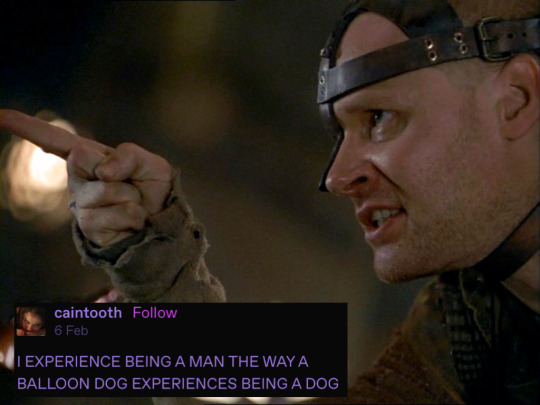
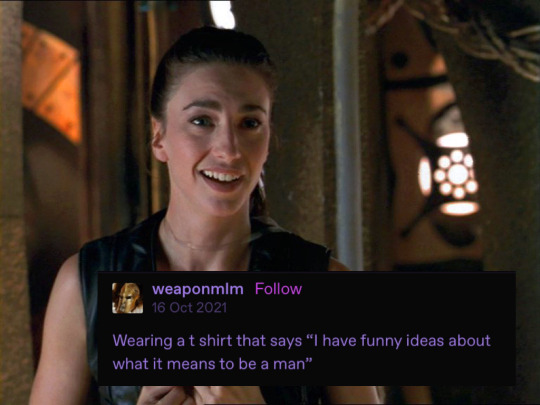

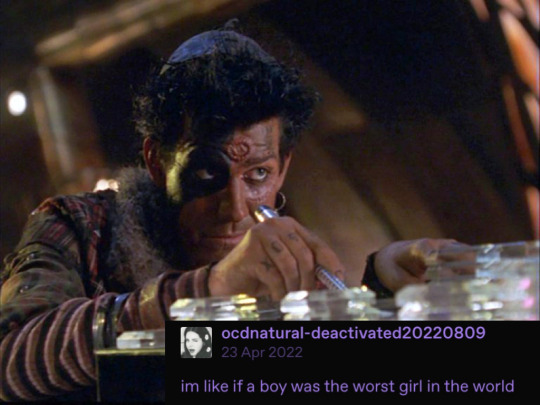
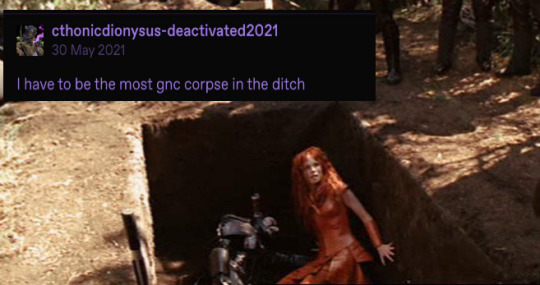
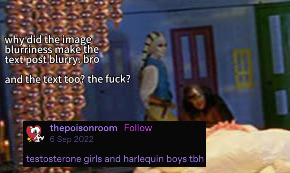
Farscape as things from my own #gender tag. for funsies .
bonus:

#chiana has some kinda funky gender thing going on idk how else to describe it. stark too.#like jokes/trans headcanons aside there’s something about the like. narrative framing? of how those two are characterised#like Chiana isn’t a girl she’s a twink. she’s a weird goth little fag.#and stark. that is not a man. that is every extra from a shakespeare play crammed into one person. that is a damsel in distress. a boytoy.#and that’s to say NOTHING of John Crichton because everyone has already said it in better ways than i could. but yeah.#also obligatory scorpius canonically has a pussy he told me himself. and Zhaan’s plantshlong tastes like marzipan.#anyway !#farscape#farscape text posts#your daily dose of idiocy
97 notes
·
View notes
Text
Kojima Cinema Vol. 4: Lost World

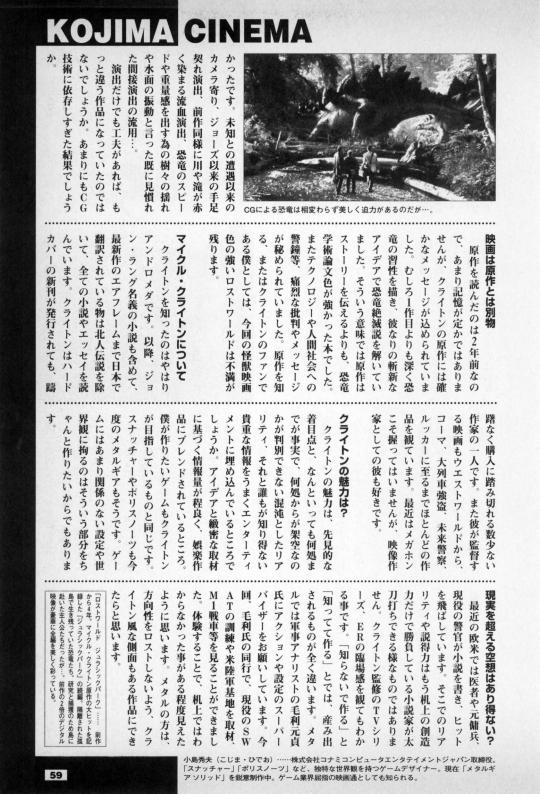
Greetings from Kojima Cinema in the U.S.
At the end of the previous month we went to the United States to attend the Electronic Entertainment Expo (E3), as well to research data for Metal Gear Solid. For this installment of Kojima Cinema, I'll discuss Lost World, the sequel to Jurassic Park, which I snuck out to see after attending E3, as well as its creator Michael Crichton (who happens to be one of my favorite authors).
By the way, Lost Warld (as in a combination of World and War) was the title of a canceled project that was planned to be my first game.
Lost World from Atlanta
I saw Lost World in a movie theater inside the CNN building in Atlanta. Since it hasn't been released in Japan yet, I was able to see it without any preconceived notions, but it ended up being very disappointing. Certainly there's a lot more CGI than the first movie and the dinosaurs are even better animated, but the story was way too much like a Godzilla movie. (Or maybe it was more like King Kong? Perhaps it's closer to Gappa: The Triphibian Monster?) At any rate, what happened to Michael Crichton's original story? I felt like going to Steven Spielberg and tell him "please, don't ruin Crichton's work anymore!"
Better CGI, But Half The Impact
I'm already used to seeing CGI dinosaurs, so there wasn't as much of an impact as there was for the first movie. I remember being moved to tears during the first movie when the Brachiosaurus, the first dinosaur, showed up as if I was glad to see one alive. There's a similar scene in this movie where they encounter a group of Stegosauruses and then Dr. Ian Malcolm says something along the lines of "everyone is impressed at first, but then they all run away" (there were no subtitles, so I'm not certain), which is nothing but ironic.
Jurassic Park: The Ride: The Movie
Ultimately the movie's priority is to charm the audience by showing off dinosaurs. It felt as if the plot and the characters were only added there as an excuse to showcase all the popular dinosaurs like the Compsognathus, the raptors and the T-Rex. It felt less like a movie written to tell a story and more like a film version of the "Jurassic Park: The Ride" attraction at Universal Studios. If you look at it with that perspective, it's a well-made and calculated film.
Despite A Noticeable Rut in the Production, Spielberg's Style is Still in Good Health
Spielberg's heart-pounding style is still in good health despite all of this. The scene where the trailer is falling off the edge of a cliff could be said to be one of the highlights in Spielberg's career. I don't like it very much, but the succession of one crisis after the other makes my hands sweat. Especially the gimmick of the glass gradually breaking is a novelty that no one else has done before. But I was left with one unanswered question. Why does the rear hatch of the trailer only has one sheet glass?
Unfortunately there were many scenes that ended up being not very interesting due to the usual hackneyed direction. There are many indirect effects that we're already familiar with, such as the camera tracking used since Close Encounters of the Third Kind, the use of lost limbs as seen in Jaws, rivers and waterfall turning red due to bloodshed, also seen in the original movie, and the swaying of trees and vibrations of water surfaces that gives the dinosaurs a sense of speed and weight... Perhaps the film would've been very different if the direction had been more creative. Was this the result of relying too much on CGI?
The Movie is Not The Novel
It's been two years since I've read the original novel by Michael Crichton, so I might not remember the details clearly, but it contained a certain message. He portrayed the habits of dinosaurs more extensively than in his first novel and even unraveled the dinosaur extinction theory with his novel ideas. In that sense, the book was less of a story and more of an academic study on dinosaurs. It also carried poignant criticisms and messages, such as warnings about technology and human society. As a fan of Crichton who was aware of the original novel, this film adaptation with its strong giant monster movie flavor left me dissastisfed.
About Michael Crichton
My introduction Michael Crichton was naturally The Andromeda Strain. Since then I've read all of his novels and essays that were translated to Japanese, including his work under the John Lange penname, all the way up to Airframe, with the exception of Eaters of the Dead. Crichton is one of the few authors whom I buy the first edition hardcovers from without hesitation. I've also seen many of the films he has directed such as Westworld, Coma, The Great Train Robbery, Runaway and even Looker. I like him as a filmmaker, even if he hasn't been holding the megaphone lately.
The Appeal of Crichton
Perhaps Crichton's appeal is that he has a visionary focus, creates a chaotic reality that is difficult to distinguish what is fact from fiction and skillfully embeds valuable information that few people know into his entertainment. The amount of data based on ideas and meticulous research is skillfully blended into products of entertainment. I aspire for the same thing Michael Crichton does in the games that I want to make. That's how I developed Snatcher and Policenauts, and it's the same thing with the upcoming Metal Gear Solid. The reason why I'm so fixated over creating a backstory or universe that doesn't really affect how a game works is because I want to get those aspects right.
Is A Fiction That Exceeds Reality Possible?
Lately there have been novels written by doctors, former mercenaries and even active policemen that ended up becoming hits. The realism and persuasiveness of such works is not something an average novelist can compete with just their imagination alone. Even I realized that when watching ER, a TV series that Michael Crichton created. What you create with knowledge will end up being completely different from what you create without. That's why asked for military advisor Motosada Mori to supervise the action and backstory in Metal Gear Solid. Recently, alongside Mr. Mori, we were able to gather research at a SWAT drill and a military base, where even saw an M1 tank. I think I was able to understand some things with such experience that I wouldn't able to from working at a desk alone. With Metal Gear Solid I hope I will able to create a video game with a Crichton-like aspect to it and not be lost in direction.
Source: Game Hihyо̄ Vol. 16 (September 1997), page 58-59
32 notes
·
View notes
Text
I wrote so much thoughtspew about the first two seasons of Farscape and serialization vs episodic plot in late-90′s TV and character progression, and then I put a cut there because I’m not an animal.
An interesting thing that happens in Farscape (and I’m a couple of episodes into season 3, and have not been particularly good about any sort of liveblogging, as expected): we don’t actually see the first time John Crichton, intentionally and in his right mind, specifically chooses to and succeeds in killing someone he’d consider a person.
I was keeping an eye out for it--I knew it would happen sooner or later, and early Season 1 Crichton, who thinks he can talk Crais out of his vendetta by explaining it was a car accident; who brokers a deal with the Genesis and then sends a Marauder crew of Peacekeepers off of Moya alive; who spends the entire first episode confused and captured and shot at by various people and then insists, when he’s finally the one with the gun and the handcuff keys, that the Moya crew rescue Aeryn right along with him--that Crichton is so deliberately and fundamentally not a killer. It’s one of his firmament truths about the world. You don’t kill people. That’s not how the world works.
And it was so clearly one of the things that was going to get stripped away in the breaking-down of John Crichton (which I remembered enough about Farscape to know would happen, but could not have described the trajectory of). So I was keeping an eye out for it, and I realized, we never quite get it.
There’s a moment in Maldus’s trap, with Crais, where he decides to hell with it and tries to kill Crais--but fails.
There’s the virus that takes him over, uses John’s own two hands to beat a Peacekeeper scientist to death--but John doesn’t remember that, wasn’t in control, isn’t really to blame.
And then there’s the Peacekeeper ship that leaves Moya at the end of the episode, that John figures out how to blow up by its trail of cesium fuel--but the only person on board the ship is possessed by the virus, is a zombie, could never be saved, and everyone knows killing a zombie isn’t the same as killing a real person, right?
There’s the firefight as he escapes the Gammak base, and maybe he hits someone lethally and maybe not, but who knows? There is, of course, the plan several days later that destroys the base completely--ignites an entire moon, and surely dozens, hundreds (thousands?) die with that. So maybe that’s it. Maybe that’s the moment. Or maybe by that point the moment’s already passed.
By the fourth episode of season 2, John stabs T’raltixx straight through the chest with a quolta blade, stone dead, up close, at a range to see his face and his blood, but of course he’s half-crazed from light emissions at that point, so that’s not quite right either. But by that point it doesn’t feel new or horrifying any more anyway. By that point John carries a pulse-pistol as a matter of course, and has probably used it off-camera and we haven’t even seen it. By the time his caveman and superbrain doubles show up he’s ready to shoot first and ask questions later. By the time he’s kidnapped by the Scarran on the commerce planet, he thinks of himself as a person who’s killed, who’s grown callous to the suffering of others, who his mother would be ashamed of.
John spends a lot more time threatening to shoot people than actually shooting them, but his aversion to pitched battle in the timeslip episode near the beginning of season 3 has a lot more to do with timeline integrity than avoiding death. He goes into a firefight of pitched battle at the end, and shoots to kill, and succeeds again and again and again, and the only people whose deaths he regrets at the end of it are the ones he tried to save.
The thing is, I’m really into how these gradual character shifts happen. I’m intrigued by the lack of a clear-cut start/stop point. Because I think that’s how it happens for the characters, too.
John Crichton never wakes up and thinks, I’m a different person today than I was yesterday. He doesn’t notice the first tilot me he really kills someone, on purpose--it’s a thing that happens in the middle of ten thousand other things, and by the time he has time to sit down and process the fact that it happened, it has happened, and has been happened, and there’s something else new to worry about now anyway.
John stops wearing his IASA flight suit and it’s just sort of a thing that happens, and maybe it’s laundry day or maybe it’s the day he dressed up to pretend to be a Peacekeeper and everything went to shit, and in retrospect it matters but at the moment it’s nothing. You can point to the end of S1 as a major turning point for him, but plenty of things turned around before that point happened. And of course, you can point to the chip as the explanation for so much of the rage and the violent impulses John’s throwing around in season 2--but it’s not like one of the (many, many) one-off mindfrells that dissipate at the end of an episode and leave whoever-it-is alone to be themselves again. Season 3 John may be ‘himself again’, but whoever his self is, it’s a pretty far cry from who he was when the chip first went in.
I’ve been thinking a lot about this gradual style of character development, where the Big Meaningful Things just sort of happen in the background and you don’t notice until they’re over. And I wonder how much of it is about the way episodic TV happened in the late 90′s vs today.
In the late 90′s, nobody made TV shows for people to marathon. I remember 1999. We had a VCR, which nobody in the house knew how to program, and no cable which meant that any episodes of Farscape I watched were on tape at my best friend’s house and usually out of order. Any shows I did watch as they aired were often out of order: some weeks it’s a new episode, some weeks it’s a rerun, some weeks you go to your sister’s play and miss it entirely, some weeks it’s preempted by The Sports. Serialization was a thing, but there was absolutely less continuity from one episode to the next than you might get from, say, Sens8, or Steven Universe, or even something like The Good Place--which is an episodic sitcom, but still builds each episode off of events in the episode before. I remember watching The Wire for the first time, on DVD, in 2010, and saying to my friends, “this is a different kind of tv show”. Every single episode acted as a chapter in a story, rather than a stand-alone piece that could be shuffled into a different order within the guidelines of a couple of specific signpost events. And the kind of character development you do in a show like that, a show made for the internet generation, a show whose creators expect it to be binged, is different.
Farscape has a lot of continuity, but it also uses the status quo as a tool. Half the episodes start of in media res. We don’t need to know the specifics of how we got to wherever we are today, and it doesn’t have anything to do with the last episode. We know the generalities: we’re on Moya, we’re generally in trouble of some kind, and now we’re going to find out what new difficulties today has brought. Along with that, we know the status quo of characters. In Season 1, we know John Crichton is desperate to go home to Earth, is confused and out of place, would rather talk than hurt anybody, or let anybody hurt anyone else. That’s who he is. Episodes where he doesn’t act that way--trying to kill Crais and then very nearly killing Maldus--they’re anomolies. One really bad day. That’s why it’s so easy to shrug off the time he explodes the Peacekeeper shuttle with the virus-infected captain in it. That can’t really be Crichton committing murder, because that’s not who he is. That’s not who the status quo says he is. If that’s who he is, it changes the status quo.
And the thing is, using status quo as a tool like that allows the show to do a lot of very gradual character development without the audience or the characters themselves actually noticing. Season 2 Crichton is so angry all the time, but--well, it’s just bad days, because we know Crichton, and he’s a good guy who doesn’t like violence. Or, once it’s been going on long enough--okay, I guess this is the new status quo, he’s just an angry guy. Was he always like this? Guess he changed while we weren’t looking. The show doesn’t start to reveal what’s up with the chip until the back half of the season. And then suddenly there’s a reason Crichton’s been acting like this, and that makes sense, but also by that point it’s become part of the status quo. Crichton knows how to do violence and is so frustrated all the time. That’s part of who he is now.
And I think the show really benefits from being watched with that mindset, because it feels like the characters are just as used to thinking of themselves and their friends in terms of status quo as we are. I’m thinking about the episode where Zahn and D’Argo and Rygel rip off Pilot’s arm and then turn on each other. By that point they’ve stood by each other through all sorts of problems, risked their lives for each other, and for Pilot and Moya, no question. But the opportunity to go home comes up, and they each think about who they are, who they think they are, and they think, ‘I am a person for whom going home is the Number One Priority’. Never mind how little time they’ve spent seeking out a way home compared to how much time they’ve spent taking care of each other. By season 3, John loves Aeryn, loves Moya and her crew, would die for them and has actively tried to do so on multiple occasions, but he puts them all in danger for a chance at a wormhole and a way home. Not because going home is actually more important to him than their safety--if you set out the choices in front of him, if you said ‘You go home but Moya and everyone on her will suffer or die’, he’d give up the chance to go home without question. But the option comes up, and the little self-identification flag in his head goes, ‘Astronaut John Crichton, US of A, wants to go back to Earth more than anything in the world’, like a one-note character description blurb.
Farscape works really well when viewed as a show about a bunch of people who spend very little time actually thinking about where they’re going and why. They drive around in circles getting into and out of trouble, trying to keep safe and keep fed, reacting to one problem after another, and not one of them has any kind of plan for getting the things they say they want. Ask anybody on Moya if they intend to spend the rest of their lives there, they’d say no (or, ‘probably, and it looks like that’ll be about half an arn, now shut up and let us figure out how not to die’). But not one of them have an actual plan for leaving her.
#farscape#driveby meta attack#I have no idea if there's an actual thesis here#I think I circled around it and lost the plot a couple of times
147 notes
·
View notes